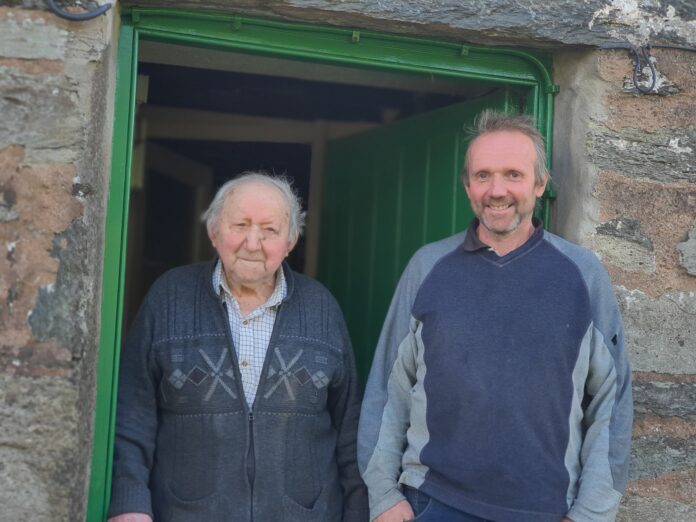Being forced by the government to grow oats on rough land and watching the first tractor arrive in a village are just two memories from a lifetime of farming for one Farmers’ Union of Wales member.
Robert Davies and his son Gwynfor between them have more than 130 years experience of farming in Cwm Penmachno.
“My father was a quarryman whose interest wasn’t really in farming. But that’s what I wanted to do and my father knew that so he took on Pen y Bryn until my mother and I started farming after I left school aged 15.
“John Williams was Lord Penrhyn’s agent at the time and he used to visit Pen y Bryn often to ask my father to take over the tenancy at Pen y Bedw as nobody wanted the tenancy here. We had been at Pen Bryn since 1939 when I left school and he eventually agreed and took over the 240 acre farm when he signed a lease from Lord Penrhyn who owned most of the land in the valley back in 1950.
“It was soon after the war and each farm was told how much to plough by the government in order to feed the nation. In Penbedw we used to plough 10 acres of oats with an acre of potatoes within that. We would harvest the oats and take it to be crushed in the mill in Pentrefoelas,” said Robert.
When the government orders stopped, Robert stopped growing oats and moved to keeping sheep and cattle, more suited to the land.
But there were bigger changes ahead. The war had meant huge leaps forward in technology and advances in tank design were transferred to build tractors and the ‘Fergie Fach’ came on the market.
Initially the uptake in the valley was slow. Farming depended on horses to do the heavy work and moving to tractors involved a substantial outlay to resolve an issue many of Cwm Penmachno residents didn’t feel was a problem.
“We were sticking to the Shire horses. I liked the horses. We used to go around ploughing with the horses helping people. Today it would be called contracting.
“In 1947 a tractor salesman started coming around the area and sold one to Foel Farm. In the years after that we all started buying tractors. In those days a Fergie Fach [Ferguson TE20 ‘Grey Fergie’] would cost you £325 and a plough would cost £25, so for £350 you had the tools to make ploughing so much easier,” explains Robert.
Horses however, were not completely redundant. Robert was often asked to help out with horses on other important occasions in the village.
“We used to help with the hearse. The hearse used to be kept in a shed in the village and when the carriage needed to be taken to the cemetery I would take the horse to draw it. One day, I was booked for two funerals but the first funeral service took a bit longer than expected.
“I was holding the horse for over an hour whilst they went to chapel, waiting for them to come out so we could go to the cemetery. It was terrible weather and I was dripping, absolutely soaked. I knew I had a second funeral to do so I had to get a move on.
“It was quite amusing to hear from my father after his day’s work at the quarry on the following Monday that many of the mourners were complaining that I was going too fast as they were trying to walk behind the hearse and struggling to keep up. Almost running,” he remembers.
Though seemingly innocuous at first, the next major change was to have even greater implications than the onset of farm technology. When the fourth Lord Penrhyn died in 1951 most of Cwm Penmachno farms were handed to the Government in lieu of death duties. The National Trust and the Forestry Commission took control of the land in the valley.
Gwynfor said: “I farm it these days. The site is under environmental restrictions regarding how many sheep I can keep. We have about 400 sheep but the number of cattle gets fewer and fewer each year. All influenced by the environmental schemes such as Tir Gofal and then the Glastir scheme. Much of the best semi-rough pasture land in the valley is under blanket forestation.
”There are more regulations almost every year and the keeping of the books such as the livestock movement books, the medicine book, stocking diaries and all that, when you’re not keen on the pencil it’s a lot of work.”
And Gwynfor’s thoughts on the future?
“That depends on the farm support. That’s what keeps you going. Not the farming. If there was no farm support it would make it very difficult. Nigh on impossible.”

| [donate]
| Help keep news FREE for our readersSupporting your local community newspaper/online news outlet is crucial now more than ever. If you believe in independent journalism,then consider making a valuable contribution by making a one-time or monthly donation. We operate in rural areas where providing unbiased news can be challenging. |


















